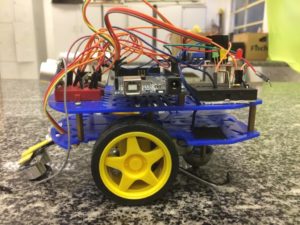São Paulo – Brazil will be represented in the science and technology exhibition MILSET Expo-Sciences Asia 2022 to take place in Dubai, United Arab Emirates, from February 20 till 25, in The Cultural and Scientific Association. The professor Eliandro Rezende da Silva and the student Marcos Magalhães will travel to the emirate to present their project Orianna, a voice-activated virtual assistant for wheelchairs for people with motor disabilities. The project is under development in the labs of the São Paulo State Technological Colleges (FATEC) Mogi Mirim.
The software allows the user to control their wheelchair and gives them autonomy to perform day-to-day tasks like turning on the light and electronics and other activities. It also identifies holes and obstacles in the way, thus preventing accidents, and is suitable for paraplegics, tetraplegics and amputees.
Eliandro Silva is professor of Industrial Mechatronics and Mechatronics Projects at FATEC Mogi Mirim. He told ANBA the project started back in 2018, when he was giving a Physics and Robotics class at the Padre Longino Vastbinder State School in Mogi Guaçu.
Silva notice Magalhães liked to play videogames in the freshman year of high school and asked him to participate in research projects. In his sophomore year in 2018, Magalhães created the virtual assistant Orianna. Back then the project also featured the student Emily dos Santos. The prototype won awards in science fairs and even an honorable mention by the governor of the state of São Paulo.
The technology was first applied to a miniature wheelchair, and a life-size prototype is being developed now. For the MILSET Expo-Sciences Asia 2022, Silva and Magalhães will take the miniature prototype, as it’s more easily transportable.
Research work
The years of work were recognized by several awards like the first place at the International Inclusion Technology Show in Argentina, which accredited them to go to Dubai. “The topic of the show in La Matanza [in Buenos Aires] was inclusion, so projects for people with visual, motor and cognitive disabilities were presented,” he said.

The student Marcos Magalhães studied at FATEC but is now at the Federal Institute of Computer Science. The project is still under development at FATEC. “Academic projects aren’t fast; it takes time to evolve and get where we are at. Now we are in the human test phase, putting it into practice, and we have a partnership with the medical sector of UNICAMP,” Silva said. UNICAMP helps by selecting people with disabilities to test the prototype. “They accept to participate in the tests and helps us by sitting on the chair and trying the virtual assistant,” he said.
The life-size Orianna-equipped chair has two versions, the electric wheelchair, where the artificial intelligence was adapted into, and a common wheelchair adapted so that it can run the technology.
Eliandro Silva and Marcos Magalhães will travel on February 16 and will represent the state of São Paulo and the Movement for Science and Learning of Brazil. Silva has recently learned that a team from Ceará will also participate in the show, representing Northeast’s Science and Technology Fair.
The Orianna project is sponsored by the companies Cortag, ASW Brasil and Big Bom Supermercados. UniMogi and Colégio Mackenzie also support the project. The professor created a crowdfunding to pay for the trip.
Translated by Guilherme Miranda




